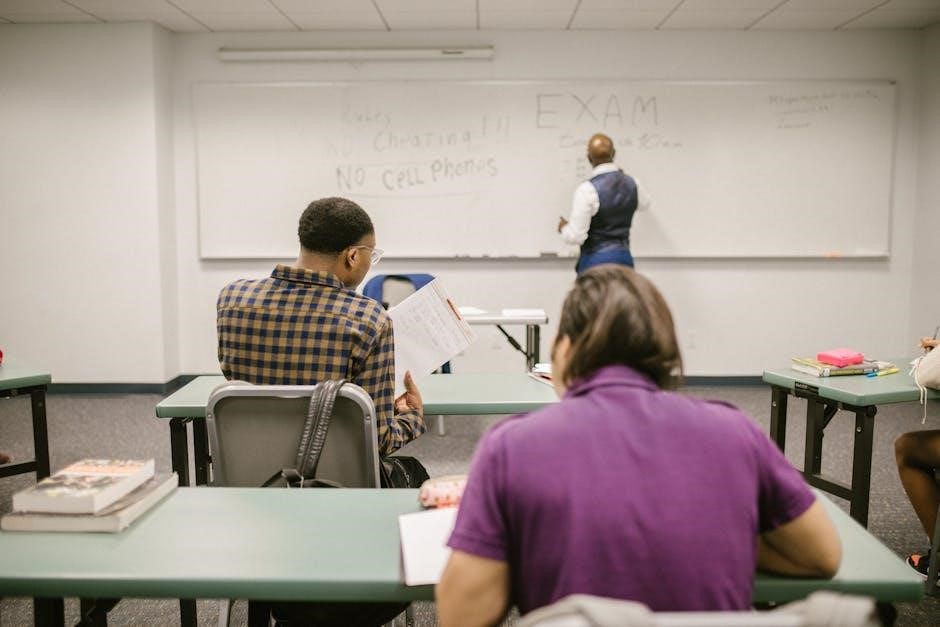Overview of the NFHS Fundamentals of Coaching Test
The NFHS Fundamentals of Coaching Test evaluates core coaching principles‚ ensuring coaches prioritize student-athlete growth‚ sportsmanship‚ and safety. It includes multiple-choice and true/false questions‚ assessing knowledge of key coaching concepts‚ legal responsibilities‚ and ethical practices to promote positive team culture and athlete development.
1.1 Key Objectives of the Test
The NFHS Fundamentals of Coaching Test aims to assess coaches’ understanding of key principles‚ focusing on student-athlete growth‚ safety‚ and ethical practices. Objectives include evaluating knowledge of legal responsibilities‚ promoting sportsmanship‚ and ensuring coaches align their philosophies with educational missions. The test also emphasizes identifying core values‚ understanding the role of winning‚ and fostering positive team cultures while addressing misconduct.
1.2 Format and Structure of the Exam
The NFHS Fundamentals of Coaching Test features a mix of multiple-choice and true/false questions‚ designed to evaluate a coach’s understanding of essential concepts. The exam covers topics such as legal responsibilities‚ emergency care plans‚ and coaching philosophies. The format ensures a comprehensive assessment of knowledge‚ with a focus on practical application in real-world coaching scenarios to ensure student-centered approaches and safety protocols.
Key Attributes of Effective Coaching
The NFHS Fundamentals of Coaching Test includes multiple-choice and true/false questions‚ assessing knowledge of legal responsibilities‚ emergency care plans‚ and coaching philosophies. The exam evaluates practical application skills‚ ensuring coaches can implement safe‚ student-centered approaches in real-world scenarios.
2.1 Understanding the Educational Mission of Athletics
The educational mission of athletics focuses on promoting learning‚ self-esteem‚ and school pride while developing life skills and character. Coaches play a crucial role in fostering this mission by creating an environment where athletes grow academically‚ socially‚ and personally. The goal is to ensure athletics complement education‚ preparing students for future challenges through teamwork‚ discipline‚ and ethical behavior.
2.2 Identifying Core Values in Coaching Philosophy
Identifying core values is fundamental to shaping a coaching philosophy. Coaches must reflect on personal beliefs and principles that guide their approach. Key values often include integrity‚ respect‚ and responsibility. Aligning these values with the mission of interscholastic athletics ensures consistency and fosters a positive environment. This self-awareness helps coaches make ethical decisions and model behavior for athletes‚ promoting a culture of trust and accountability.
Sample Questions and Answers
Sample questions cover key areas like emergency care plans‚ ADA accommodations‚ and coaching values. Answers provide clear explanations‚ helping candidates prepare for the exam effectively.
3.1 Multiple-Choice Questions
Multiple-choice questions assess knowledge of coaching principles‚ such as emergency care plans‚ ADA accommodations‚ and the purpose of interscholastic sports. Examples include identifying signs of substance abuse or understanding Title IX requirements. These questions evaluate a coach’s ability to apply key concepts to real-world scenarios‚ ensuring they align with the NFHS mission of promoting student growth and safety in athletics.
3.2 True/False Questions
True/False questions test understanding of key concepts‚ such as recognizing substance abuse signs or emergency care essentials. For example‚ “Stimulants cause loss of body control” (True) or “Hallucinogens are common in sports” (False). These questions ensure coaches grasp critical definitions and scenarios‚ aligning with the NFHS mission to promote safety‚ ethics‚ and effective coaching practices in interscholastic athletics.

The Role of a Coaching Philosophy
A coaching philosophy serves as a guiding framework for decision-making‚ defining core values‚ and aligning with the educational mission of interscholastic athletics‚ ensuring consistency and purpose.
4.1 Defining Personal Coaching Philosophy
Defining a personal coaching philosophy involves reflecting on core values‚ beliefs‚ and goals. It shapes interactions with athletes‚ emphasizing growth‚ respect‚ and teamwork. A clear philosophy guides decision-making‚ fosters positive relationships‚ and aligns with the educational mission of athletics‚ ensuring consistency in coaching practices and priorities.
4.2 Aligning Philosophy with Interscholastic Athletics Mission
Aligning your coaching philosophy with the interscholastic athletics mission ensures consistency in promoting education‚ growth‚ and teamwork. Coaches must integrate their personal values with the broader goals of fostering a positive‚ student-centered environment. This alignment guarantees that coaching decisions and actions reflect the mission‚ creating a cohesive and purposeful approach to athlete development and team culture.

Legal and Ethical Responsibilities
Coaches must adhere to legal standards and ethical principles‚ ensuring compliance with regulations like Title IX and ADA‚ while promoting fairness and safety in all activities.
5.1 Understanding Title IX Requirements
Understanding Title IX is crucial for coaches to ensure gender equality in sports. It mandates equal opportunities‚ resources‚ and treatment for male and female athletes in educational programs. Coaches must avoid discrimination‚ provide fair facilities‚ and promote inclusive participation. Compliance with Title IX fosters a balanced and equitable athletic environment‚ aligning with legal and ethical coaching standards.
5.2 Accommodations Under the Americans with Disabilities Act
Coaches must understand ADA requirements to ensure equal access for athletes with disabilities. This includes providing reasonable accommodations‚ such as adaptive equipment or modified practices‚ unless it causes undue hardship. The ADA mandates equal opportunities and prohibits discrimination‚ fostering an inclusive athletic environment that supports diverse student needs while upholding the educational mission of sports.

Promoting Sportsmanship and Positive Team Culture
Coaches must model respect and integrity‚ fostering a culture of sportsmanship. Encouraging open communication‚ teamwork‚ and empathy helps build a positive environment‚ enriching athletes’ experiences.
6.1 Strategies for Building Team Morale
Coaches can enhance team morale by fostering inclusivity‚ recognizing achievements‚ and promoting positive reinforcement. Setting clear goals‚ encouraging open communication‚ and organizing team-building activities also help. Celebrating successes and supporting during challenges creates a supportive environment‚ ensuring athletes feel valued and motivated to contribute to the team’s collective success.
6.2 Addressing Misconduct and Conflict
Addressing misconduct and conflict requires clear communication‚ consistent enforcement of rules‚ and fair treatment. Coaches should actively listen to concerns‚ remain impartial‚ and promote problem-solving discussions. Establishing a positive team culture and encouraging accountability among athletes helps prevent issues. Conflict resolution strategies should focus on maintaining respect‚ fostering understanding‚ and ensuring a supportive environment for all team members to thrive.

Athlete Development and Safety
Athlete development focuses on enhancing physical‚ emotional‚ and psychological well-being. Safety involves recognizing substance abuse signs‚ maintaining emergency care plans‚ and preventing injuries to ensure a secure environment.
7.1 Recognizing Signs of Substance Abuse
Coaches must identify substance abuse signs‚ such as stimulant use leading to loss of control‚ depressants causing hostility‚ and hallucinogens like marijuana affecting behavior. Awareness of these indicators helps in early intervention‚ ensuring athlete safety and well-being. Recognizing these signs is crucial for maintaining a healthy and supportive team environment.
7.2 Emergency Care Plan Essentials
An effective emergency care plan includes a written protocol‚ trained staff‚ and clear communication. It should outline first aid procedures‚ emergency contact details‚ and steps for serious injuries. Regular updates and practice drills ensure preparedness. This plan is vital for promptly addressing injuries‚ minimizing risks‚ and ensuring athlete safety during practices and competitions.

Utilizing Resources for Exam Preparation
Utilize Quizlet flashcards for memorizing key terms and concepts. Seek mentorship from experienced coaches for guidance and insights‚ enhancing your understanding of exam content and format effectively.
8.1 Benefits of Using Quizlet Flashcards
Quizlet flashcards offer an interactive way to memorize key terms and concepts‚ enhancing exam preparation. They allow users to track progress‚ identify weak areas‚ and study on-the-go via mobile apps‚ making learning efficient and accessible. This tool is particularly useful for reviewing coaching principles‚ legal responsibilities‚ and safety protocols‚ ensuring comprehensive understanding of exam content.
8.2 Importance of Mentorship in Coaching Development
Mentorship provides valuable guidance‚ practical insights‚ and support for new coaches. Experienced mentors share strategies for building team morale‚ addressing misconduct‚ and aligning coaching philosophies with school missions. This collaborative approach fosters professional growth‚ enhances coaching effectiveness‚ and ensures alignment with interscholastic athletics goals‚ benefiting both coaches and student-athletes in their development journey.
The Importance of NFHS Certification
NFHS certification establishes credibility‚ ensuring coaches are well-trained in legal‚ ethical‚ and educational standards. It promotes student-athlete well-being‚ aligns coaching practices with school missions‚ and fosters a culture of safety‚ respect‚ and excellence in interscholastic athletics.
9.1 Requirements for Teacher-Coaches
Teacher-coaches must complete the NFHS Fundamentals of Coaching course‚ mandatory for those in grades 7-12 in Ohio. This one-time requirement ensures coaches understand key principles‚ legal responsibilities‚ and ethical practices. The course focuses on student growth‚ safety‚ and fostering a positive team culture‚ aligning with the educational mission of interscholastic athletics.
9.2 Advantages of Completing the Course
Completing the NFHS course enhances coaching skills‚ ensuring a safe and effective athletic environment. It provides practical strategies for improving athlete performance and fostering positive team dynamics. Coaches gain knowledge on legal and ethical responsibilities‚ advancing their professional development and contributing to the overall success of interscholastic programs.

Final Exam Preparation Tips
Review key concepts‚ use Quizlet flashcards for interactive study‚ and practice with sample questions. Focus on understanding principles rather than memorizing answers for long-term success.
10.1 Adapting Training Sessions to Student Needs
Coaches should assess individual player abilities and tailor sessions to meet diverse needs. Modify exercises to suit skill levels‚ focus on weaknesses‚ and incorporate feedback. This student-centered approach enhances engagement and performance. Ensure activities align with team goals while addressing specific areas for improvement. Regularly adjust plans based on progress and player feedback to maximize development and maintain motivation.
10.2 Understanding the Body of a Workout Session
The body of a workout session is where the main training occurs. It includes high-intensity drills‚ skill development‚ and conditioning exercises. Coaches should focus on proper technique‚ player engagement‚ and gradual progression. This phase builds strength‚ endurance‚ and sport-specific skills while maintaining safety and promoting teamwork. Effective execution ensures players are prepared for competition and long-term success. Monitoring progress is essential.